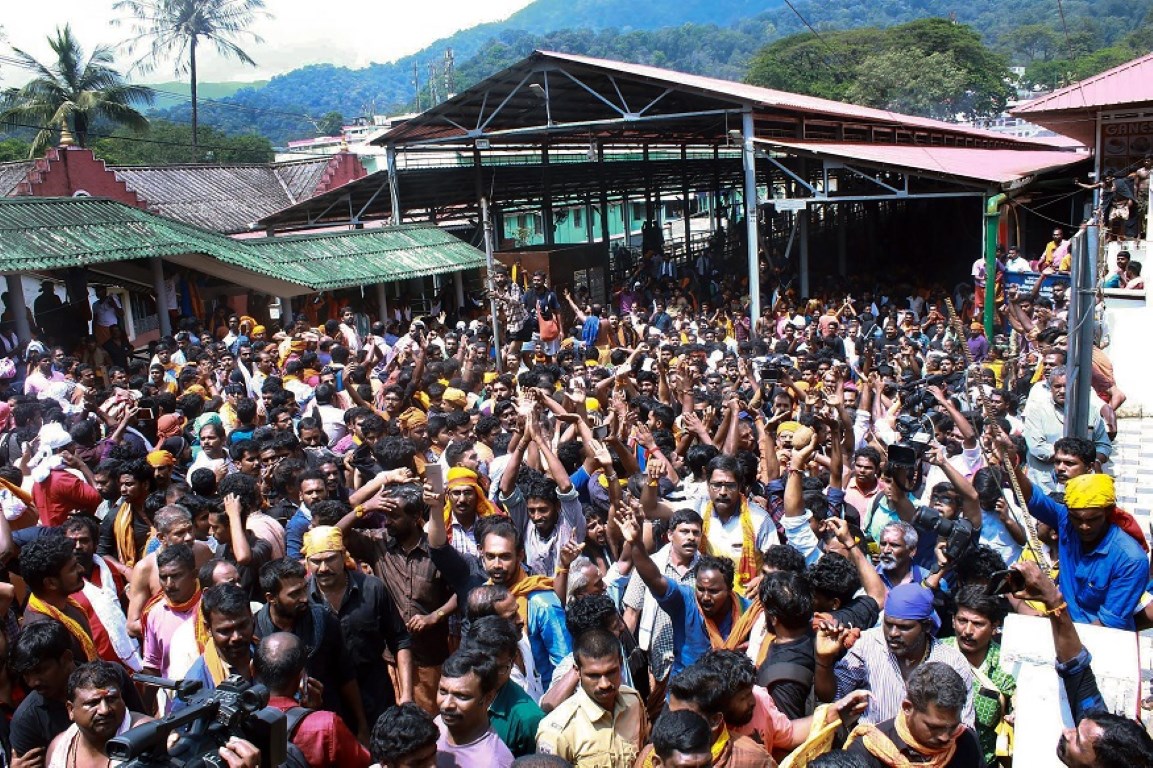Sabarimala verdict: faith vs rights
November 16, 2018 | Expert Insights

The Supreme Court’s verdict in te Sabarimala issue in Kerala, comes just before the start of Vrischikam, the start of the Malayalam month that marks the beginning of the annual pilgrimage to Sabarimala Temple.
SC will resume a public hearing of the review petition with newly appointed CJI Ranjan Gogoi on 22nd January 2019.
Background
The Sabarimala Temple is a pilgrimage site devoted to the adoration of Lord Ayyappa - a prominent deity from the south-western princely province of Travancore, now situated in the State of Kerala. The site is frequented annually by over twenty million devotees and pilgrims often following the tradition of a two-month long pilgrimage by foot to pay homage to Lord Ayyappa.
Women aged 10-50 are barred from entering the Temple as the devotees, also known as “Ayyappans” believe that Lord Ayyappa dwells within the temple in the form of an eternal celibate, known as a ‘Naishtik Bramhachari’. The devotees begin their pilgrimage during the month of November. Ayyappans must follow a strict rule of penance and celibacy for a period of 41 days known as Vratham, originating from the term Vratha meaning ‘devotion’ or ‘vow’.
On April 5th 1991 an “Ayyappan” filed a Public Interest Litigation suit against the Devaswom Board, an autonomous body constituted under the Travancore Cochin Hindu Religious Institutions (Amendment) Act, 1955. The devotee questioned the validity of the restriction of women from the Sabarimala Temple before the Kerala High Court. The verdict given by the Kerala HC upheld the rule of restriction of women in temples.
The Constitution of India guarantees to its citizens the right to Justice, Equality and Liberty as pledged in the preamble. These are embodied in the Fundamental Rights, Articles 12 to 32. The Constitution under Article 25 assures freedom of conscience and freedom to profess, practice and propagate the religion of choice. Article 26 allows religious denominations and sections thereof the freedom to manage their own affairs without interference from the state. However, both Articles are subject to public order, morality and health. Under Article 32, a Public Interest Litigation suit was brought before the Supreme Court.
Analysis
The Supreme Court set up a new constitution bench headed by Chief Justice Dipak Misra along with Justice K. M. Khanwilkar, Justice D Y Chandrachud, Justice R. F. Nariman and the only female judge Justice Indu Malhotra. The verdict reached on 28th September 2018 annulled the verdict that restricted women between the ages of 10 to 50 from entering Sabarimala temple. The five-judge bench reached a 4-1 outcome with the dissent coming from the sole woman judge.
The majority vote stated that the exclusionary practice of women aged 10 to 50 was violative of the fundamental rights under Article 25. The object of the constitution is the protection of every citizen’s fundamental right. According to the Devaswom board, women of menstrual age were disallowed due to the deity being a ‘Naishtik Brahmachari’. The custom followed the rule of celibacy in keeping with Lord Ayyappa’s teachings in the Bhuthanatha Geetha. Women are considered to be “impure” and “polluted” during the menstrual period and are not allowed inside a temple.
Women are unable to stop their biological processes during the 41day period and hence they are not allowed within temple premises. The court held this practice to be in violation of Article 25(1) in which the term “all persons” specifies that every person is allowed freedom to profess their faith, including women. The fundamental right guaranteed under this article goes against the exclusionary practice of physiological and biological factors that are specifically attributed to women.
Counterpoint
The Devaswom board argued that the “Ayyappans” was a religious denomination and are entitled to freedom of managing religious affairs under Article 26. The Court found that the devotees of Lord Ayyappa do not constitute a separate religious denomination. This outcome was reached with the understanding that although the Ayyappans refer to themselves under a different name, their practices and beliefs are not widely different from those that are followed by ordinary Hindu’s. The state of Kerala has various temples dedicated to different avatars of Lord Ayyappa that do not indulge in restriction of women. The court reached the conclusion that “Ayyappans” are under the category of ordinary Hindus.
Justice Indu Malhotra, the sole judge to oppose the verdict advocated letting ‘faith be’, however irrational. “In a secular polity, issues which are matters of deep religious faith and sentiment must not ordinarily be interfered with by courts”, she remarked. Justice D Y Chandrachud termed the custom as a form of “untouchability”. He goes on to state “Article 17 certainly applies to untouchability practices in relation to lower castes, but it will also apply to the systemic humiliation, exclusion and subjugation faced by women.”
Assessment
Our assessment is that the constitution is a living organism whose object is a transformative one and cannot allow non-retrogression of fundamental rights. However, courts must be careful with addressing religious beliefs so as to maintain the delicate balance of secular polity in a country as diverse as India.








Comments